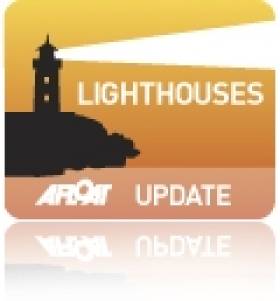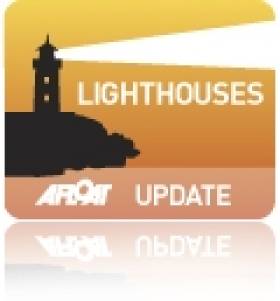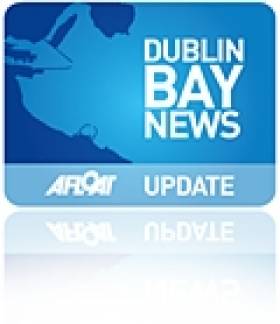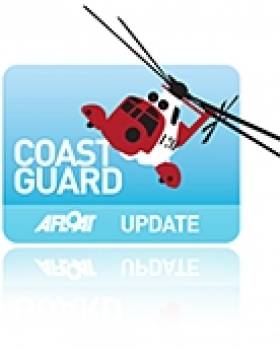Displaying items by tag: Commissioners Irish Lights
#lighthouses – A "brand new experience to take your breath away", that's the promise from Great Lighthouses of Ireland, a new EU INTERREG IVA funded tourism initiative being launched by the Commissioners of Irish Lights.
Featuring twelve lighthouses in stunning coastal locations, Great Lighthouses of Ireland will offer memorable, enriching experiences that inspire the senses, refresh the spirit and fire curiosity, creating a deep appreciation of the role of the sea, lighthouses, past and present, and the maritime and seafaring story of the island of Ireland.
With a range of services from accommodation to visitor centres and guided tours, visitors from home and abroad will have the chance to explore the distinct experiences offered by the lighthouses, each reflecting its own history and heritage, nature and environment, people and place, with aspects to appeal to people of all ages and interests.
The Great Lighthouses of Ireland project is supported by the European Union's INTERREG IVA cross-border Programme, managed by the Special EU Programmes Body. The ambitious and imaginative cross-border project will include the preservation and conservation of the island of Ireland's important maritime and lighthouse heritage. Great Lighthouses is built on a sustainable economic model and the re-invention of individual lighthouses as visitor attractions and specialist self-catering accommodation that can contribute to local communities in terms of jobs and specialist tourism.
Irish Lights operate over seventy lighthouses around the coast of Ireland. These lighthouses, including the Great Lighthouses of Ireland, still play a vital role in maritime safety.
Great Lighthouses of Ireland partners include the Irish Landmark Trust, the Royal Society for Protection of Birds, Forbairt Fhanada Teoranta (Fanad Community Group), Clare County Council, Ballycotton Lighthouse Tours, Mid & East Antrim Borough Council, Hook Heritage limited, Valentia Island Development Company, Kerry County Council and Clare Island Lighthouse. Great Lighthouses of Ireland is also supported by Tourism Ireland, Fáilte Ireland and Tourism Northern Ireland.
Great Lighthouses of Ireland
St John's Point, Co Donegal
Fanad Head, Co Donegal
Rathlin West Light, Co Antrim
Blackhead, Co Antrim
St John's Point, Co Down
Wicklow Head, Co Wicklow
Hook, Co Wexford
Ballycotton, Co Cork
Galley Head, Co Cork
Valentia Island, Co Kerry
Loop Head, Co Clare
Clare Island, Co Mayo
Irish Lights Headquarters to Open to the Public
#OPEN HOUSE- The Commissioners of Irish Lights headquarters in Dun Laoghaire Harbour is to be made open to the public with tours on Sunday (7 October) as part of the annual Open House Weekend, writes Jehan Ashmore.
The iconic landmark building which incoporates innovative technological features is located on the waterfront within the harbour, and in which integrates seamlessly into its marine environment. The Commissioners are a General Lighthouse Authority (GLA) that is responsible for all aids to navigation around the coast of Ireland.
To enable the authority to carry out these functions, the building has an administration block and adjoining marine workshop depot. Adjacent to the facility is a berth where the ILV Granuaile (2000/2,625grt) can moor alongside to load and unload these aids to navigation. The tours will provide a fascinating insight into the work of the commissioners.
For further details and how to book a tour, plus a list of other buildings available to access and more click this LINK.
Open House Dublin is an initiative of The Irish Architecture Foundation which has an established network and track record in delivering major projects primarily aimed at developing audiences for architecture in Ireland. The foundation is also involved in raising the profile of Irish architecture abroad.
Lightship To Lead A Rocky Life?
The Dublin 'Docklands' developer, Harry Crosbie is seeking permission from Dublin City Council to raise the 500-ton lightship, Kittiwake and place on the quayside opposite The 02 Theatre. Currently the lightship is berthed nearby the East-Link road toll bridge and acts as a notable floating feature to countless daily commuters.
In 2007, the Commissioners of Irish Lights (CIL) sold the 1959 built lightship to Crosbie. The 134-foot lightship had served in that role for many years around the Irish coast. In 1981, as part of an extensive modernisation programme, the Kittiwake and other lightships were converted into an automated light-float (ALF). The last station served by the ALF was at South Rock, Co. Down.
If the former lightship is given the green light, the vessel would act as a "welcoming point" for cruise tourists. Subject to planning permission, the lightship would undergo another re-conversion project to create an open-plan café bar for a period of five years.
The veteran vessel would also have its lighthouse light restored and would "beam" across the docklands and entertainment venue. The lightship would maintain its customary 'red' hull with Kittiwake written in neon on the side.
In order to attract this cruise business to the Kittiwake, Crosbie has asked the Dublin Port Company to relocate the main existing cruise-ship location closer to the O2 Theatre. The proposal has the support of Dublin City Council.
In the meantime the majority of cruise-ships dock at Alexandra Basin, in the heart of the port's industrial zone but the distance is quite far from there to the city centre.
On an annual the capital welcomes around 80,000 passengers during each season, generally between May to October. In 2011, the port expects 86 cruise-calls, potentially generating €35m to €55m to the economy.
The proposed for the new terminal is to be submitted to the EU this month, in the hope of financing support. Meanwhile the proposed site envisaged for the cruise terminal, is occupied by tugs based operated by Dublin Port Company.
Robot Submarine to be Used in Joint Exercise off Cork Coast
A major marine search and recovery exercise co-ordinated by the Irish Coast Guard will to take place off the Cork coastline this week from 12-15 July 2010 it was announced today.
The exercise, in conjunction with the Marine Institute, the Commissioner for Irish Lights and the Navy, will simulate some major emergency situations including an aircraft crash, recovery of the 'Black Box'. The simulation exercise will also involve deep diving operations and the seeking and survey of a wrecked vessel. It will also incorporate the recovery of items such as ditched contraband and the rendering safe of underwater explosives.
A Service Level Agreement between the Irish Aviation Authority and the Irish Coast Guard was agreed in February of this year. It was agreed that should an aircraft force land in a maritime area, the IAA's Air Rescue Coordination Centre (ARCC) would be responsible for determining the initial search area, but co-ordination shall then transfer to the Coast Guard with continued close co-operation and back-up services from ARCC. As a result of this it was seen that there would need to be close cooperation between all the different agencies and authorities in responding to such a scenario. One of the most important aspects of an aircraft incident investigation is the location and recovery of the aircraft's 'black box'. The Coast Guard, as part of an Agreement with Commissioner of Irish Lights, has chartered their vessel ILV Granuaile, to act as a marine platform for Naval Divers and Holland 1, the Marine Institute's robot submarine a Remotely Operated vehicl e (ROV).
Holland 1 and the Navy Dive Team will be deployed from ILV Granuaile. Primarily used in maintenance of Aids to Navigation the ILV Granuaile is a sophisticated multi functional vessel whose 80-metre length, 16 metre and Dynamic Positioning capability make her an ideal platform for this task. The naval vessel L.E. Eithne will be on site for the duration of the exercise with its Commanding Officer acting as on-scene co-ordinator. The L.E. Eithne will act as the under water crisis management centre for all the personnel involved in the exercise, including the eighteen person naval diving team and the ROV operators and Coast Guard personnel.
Speaking today, Minister Noel Dempsey TD said: "The purpose of this joint exercise is to ensure and examine the level and quality of preparedness in the Irish Coast Guard response and that of our intra-agency partners. Simulations such as are a valuable way to test our co-ordinated emergency response to ensure that in the event of a major emergency, that the appropriate and necessary measures are in place in search, rescue and recovery."
Minister of Defence Mr. Tony Killeen T.D., said that "through Inter Agency co-operation and establishing appropriate protocols for joint exercises we can ensure our ships and our divers are ready to respond in an appropriate and timely manner for given situations."
"While the ROV Holland was acquired primarily as a research vessel, another key function is to provide the capability to assist underwater search and recovery operations," said Mr. Sean Connick, T.D., Minister of State at the Department of Agriculture, Fisheries and Food. "We are therefore delighted to take part in this important exercise, which will involve a combined national ROV team piloting the Holland 1 operated by Naval and Marine Institute pilots."
Holland 1 and Granuaile are available for inter agency work as part of Service Level Agreements between the various parties which promote inter-agency cooperation and the up-skilling of personnel in each organisations for collaborative operations.

































































